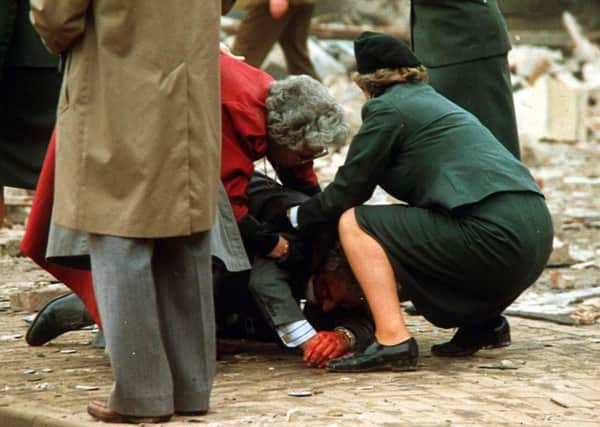Enniskillen: 30 years of pain and heartache...but still no closer to justice


What evidence there is has been analysed and assessed on a number of occasions since 1987 but the killers – and those who aided and abetted them – still roam free.
Ten suspects were detained in the aftermath of the attack but all were released due to a lack of evidence. Many of those affected by the Enniskillen atrocity are now questioning whether the criminal justice system has drawn a line under the case.
Advertisement
Hide AdAdvertisement
Hide AdAhead of the 30th anniversary, the PSNI has said its detectives will “pursue investigative options” if any new leads materialise.
Superintendent Ian Harrison said: “Since initial investigation into the bomb attack on the memorial service at Enniskillen in 1987 a number of case reviews and further investigative actions have been undertaken by police.
“Reviews conducted between 2002 and 2004 identified several areas which merited further investigation. Between 2004 and 2006 PSNI Serious Crime Branch undertook the reinvestigation of the Enniskillen bomb in line with the earlier review recommendations.”
Supt Harrison said the Enniskillen bomb inquiry was transferred to the Historical Enquiries Team (HET) for further review in 2006.
Advertisement
Hide AdAdvertisement
Hide Ad“Ten persons were arrested and interviewed during the course of the original investigation and subsequently released due to insufficient evidence to support a prosecution. In 2016 one person was re-arrested and interviewed by detectives from Serious Crime Branch. The individual was later released without charge due to insufficient evidence. The Police Service of Northern Ireland remains committed to pursuing investigative options should they develop in the future.”
The senior officer added: “The murders at the Enniskillen cenotaph remain within the extensive caseload of Legacy Investigation Branch for future review. If a new Historical Investigation Unit is established as part of political developments, the case files will pass to that body.”
The most severely injured victim to survive the bombing was Jim Dixon who was at the cenotaph with his wife Anna.
Miraculously Anna escaped physical injury, bit Jim suffered a fractured skull, broken pelvis, smashed hip, broken ribs and multiple other injuries. His lives with constant pain to this day.
Advertisement
Hide AdAdvertisement
Hide Ad“I was told by the surgeons that I never should have survived,” he said.
Mr Dixon has become increasingly frustrated at the lack of prosecutions, and firmly believes that both the US and UK administrations interfered in some way to protect key players in the fledgling peace process.
Speaking in the House of Commons in December 2005, Peter Robinson MP named one ‘on the run’ (OTR) suspected of involvement in the Enniskillen atrocity, but said the suspect was unlikely to face justice if the government pressed ahead with the legislation that would eventually lead to the ‘comfort letters’ for republicans who feared arrest.
At the time, US Secretary of State Madeline Albright said a decision not to deport a number of IRA members – who had fled to the New York area to avoid arrest in the UK – meant the terror suspects “could now contribute to the peace process” in Northern Ireland.
Advertisement
Hide AdAdvertisement
Hide AdHowever, speaking to the News Letter at the time of the 25th anniversary of the bombing, Mr Dixon said: “They have no right to deny me and others the right to have the Enniskillen bombing investigated. I believe there are letters of administration (comfort letters) in the possession of persons suspected of carrying out the [Enniskillen] bombing.”
A spokeswoman for the Northern Ireland Office (NIO) said they did “not consider it appropriate” to publish the names of those considered by the OTR administrative scheme, and denied any government interference in policing matters.
She said: “The operational independence of the police in conducting investigations is fundamental to the rule of law. The government does not interfere in operational decision making in any part of the United Kingdom.”
During a Northern Ireland affairs committee evidence session at Westminster ahead of the 25th anniversary in 2012 – examining the IRA’s use of Semtex supplied by Libya – victims’ campaigner Kenny Donaldson alleged that the NIO had blocked attempts to have Sinn Fein’s Martin McGuinness questioned about the Enniskillen atrocity.
Advertisement
Hide AdAdvertisement
Hide AdHowever, a Sinn Fein spokesperson responded, saying: “Martin McGuinness totally rejects this attempt based on unsubstantiated hearsay to link him to the Enniskillen bombing.”
Ahead of the 30th anniversary, former Fermanagh and South Tyrone MP Tom Elliott said the victims have been frustrated in their quest for justice – and that time has not made the fight any easier.
“They are frustrated and things remain very difficult for them,” he said.
Commenting on the prospect of anyone being prosecuted, Mr Elliott said: “I suppose you always have to live in hope. Each anniversary has a different poignancy for victims and families. There are some people who are no longer there who were here five years ago, and even more who were not there ten years ago.”
Advertisement
Hide AdAdvertisement
Hide AdHe said it was a relief that the sense of revulsion and anger following the mass murder did not spill over into retaliatory violence or increased polarisation.
“Generally the people around Enniskillen get on well, and their attitude following the bomb stopped community relations disintegrating.”
“People still have that attitude. They are very caring and they don’t want to make enemies of their neighbours, but at the same time there are those who would like to know who carried out the atrocity.”